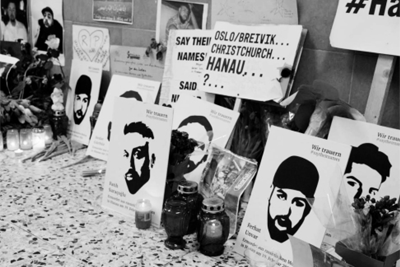
HESSISCHER FILMPREIS 2025
DAS DEUTSCHE VOLK
Documentary film, HD, 131 min., bw
Director: Marcin Wierzchowski
A co-production of milk and water, Frankfurt and strandfilm, Frankfurt
In cooperation with ZDF-3sat and HR
Funded by Hessen Film & Medien GmbH
Premiere Berlinale 2025 - Special Section
Distrubutor: rise&shine, Start: September 2025
It happened on February 19, 2020. A man in a green outdoor jacket walks across this intersection as if in a hurry, his gray cap pulled low over his face. He then picks up a gun in both hands like he's done it before. That's what you know from the movies. He fires multiple shots in a fraction of a second, as he learned in one of his countless shooting training sessions. He shoots a young man standing on the sidewalk. The man collapses.
He enters a bar with quick steps, goes to the counter, again several shots. The barman throws another bottle at the shooter and is then hit several times in the upper body and head. The perpetrator leaves the store and moves on. In the next bar he opens the door with his left hand so that it is ajar and shoots at the man sitting at the table right by the door.
He met three people, not a minute passed. He fires at a car that is trying to escape the shots backwards and with squeaking tires

Henriette and Guido - An unsual lovestory
Documentary film, HD, approx. 102 min.
Director: Stella Tinbergen
A co-production of Stella Tinbergen Film, Wiesbaden and strandfilm, Frankfurt
Funded by Hessen Film & Medien GmbH, nordmedia Filmförderung
Premiere: Dokfilm Kassel 2025
Distribitor: DER Filmverleih, Start: September 2025
Henriette is a system crasher. Born with a frontal lobe disorder,
directly after birth she remained in the intensive care unit and only
after many weeks she was given to her parents. This early childhood
trauma is expressed today in a wild mixture of aggression and neediness. The highly intelligent Henriette is fighting against rejection
which she often provokes herself. On her side there is Guido who is
steadfastly building bridges to her surroundings, which she continually destroys.
But thanks Guido she takes remarkable development steps. In
an inclusive fairy tale she defeats the magic bird and shows that
she owns capacities which are an enrichment for others. The love
story between Henriette and Guido is more than the narrative of
her struggle with and in the society. It is also an example for many
mentally ill people with their longing to be noticed and to be taken
seriously

